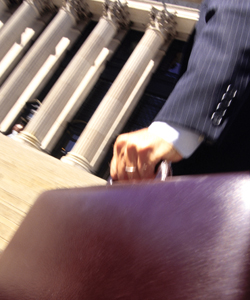 Nov. 19, 2012 – Shawano County issued noncriminal forfeiture citations against Justin Buntrock alleging he allowed illegal consumption of alcohol by underage persons. Buntrock’s attorney appeared at trial, but Buntrock did not. The circuit court entered default judgment for failure to appear.
Nov. 19, 2012 – Shawano County issued noncriminal forfeiture citations against Justin Buntrock alleging he allowed illegal consumption of alcohol by underage persons. Buntrock’s attorney appeared at trial, but Buntrock did not. The circuit court entered default judgment for failure to appear.
On appeal, Buntrock argued that his attorney could appear for him under established law that circuit courts have no authority to supersede through local rules. One of Shawano County’s local court rules states that a default judgment will be entered if the defendant fails to personally appear at trial, even if defendant’s counsel appears on his behalf.
Buntrock argued that the Wisconsin Constitution, Supreme Court Rules, and established case law determine that defendants can appear through their attorneys.
In County of Shawano v. Buntrock, 2012AP995-97 (Nov. 14, 2012) the District III Wisconsin Court of Appeals ruled in favor of Buntrock. Specifically, Judge Mark Mangerson concluded that the local court rule conflicted with established law and was thus invalid against Buntrock.
“That the circuit court has authority to adopt local rules does not mean the court may adopt rules that are in contravention of established law,” Judge Mangerson wrote.
The Wisconsin Constitution, Art. I, § 21(2), states that “any suitor may prosecute or defend his suit either in his own proper person or by attorney of the suitor’s choice” in any state court.
Wisconsin Supreme Court Rule 11.02 states that individuals “may appear by attorney in every action or proceeding by or against the person in any action except felony actions.” And in Sherman v. Heister, 85 Wis. 2d 246, 270 N.W.2d 397 (1978), the court ruled that circuit courts cannot default defendants in civil trials for failing to appear if counsel appears on their behalf.
The county argued that circuit courts can still order defendants to appear through local rules that are “likened to a subpoena.” But Judge Mangerson rejected this argument.
“Although a circuit court has statutory authority to issue subpoenas, the issuance of a subpoena has various requirements that are no satisfied by the circuit court rule,” he wrote.
Joe Forward is the legal writer for the State Bar of Wisconsin.
